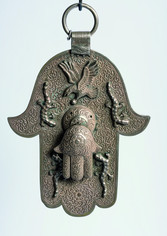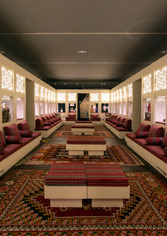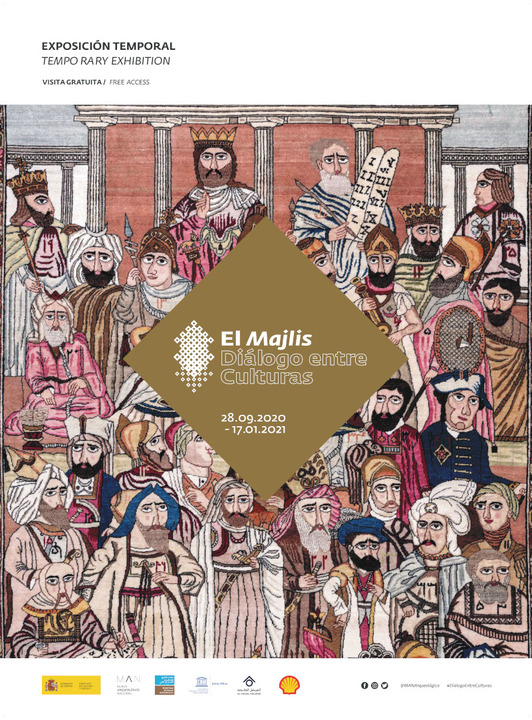Special programs
Index / Activities / Special programs / The Majlis: Dialogue among cultures
The Majlis: Dialogue among cultures
From September 28, 2020 until January 17, 2021
MADRID
Check dates and times for each activity.
Until January 17, it is possible to visit this exhibition at the
National Archaeological Museum, with which Casa Árabe is collaborating
through a parallel program of activities.
The National Archeology Museum is hosting this temporary exhibition, "The Majlis: Dialogue among cultures", a project that was begun at the Sheikh Faisal Bin Qassim Al Thani Museum (FBQ Museum, Doha, Qatar). It brings together a select collection of pieces from its holdings that tell stories about a long tradition of cultural exchange and dialogue in the Arabian Peninsula and beyond. Stories that we could hear in a majlis, a social space of great importance for Islamic culture that is present in every Arab home and which in 2015 was inscribed on the UNESCO List of Intangible Cultural Heritage of Humanity.
These stories are the basis of the project initiated by the FBQ Museum: creating a diverse forum for respectful yet inclusive dialogue that fosters connections between people, beliefs and cultures.
The main goal of "The Majlis: Dialogue among cultures" is to become a platform where significant cultural topics can be discussed and where collective thinking generates new and original perspectives.
Further information on the MAN website
These stories are the basis of the project initiated by the FBQ Museum: creating a diverse forum for respectful yet inclusive dialogue that fosters connections between people, beliefs and cultures.
The main goal of "The Majlis: Dialogue among cultures" is to become a platform where significant cultural topics can be discussed and where collective thinking generates new and original perspectives.
Further information on the MAN website
-
 Hand of Fatima, most likely of Jewish origin. Silver. Tangiers – Morocco, 19th century
Hand of Fatima, most likely of Jewish origin. Silver. Tangiers – Morocco, 19th centuryTelling the story of the current Arab world
November 17, 20206:30 p.m.MADRIDNational Archeology Museum Auditorium (address: Calle Serrano, 13) 6:30 p.m. Free entry until the event’s capacity is reached.In Spanish.Within the framework of the temporary exhibition "The Majlis: Dialogue between cultures", at the National Archaeological Museum, Casa Árabe collaborates with this round table on November 17th.The exhibition, "The Majlis: Dialogue among cultures" shows an important collection of objects that dialogue with each other about diverse histories and cultural contexts. This same diversity, symbolized in the exhibition, is what characterizes today’s societies, where concepts such as crossbreeding or hybridization are defining features of the contemporary. Madrid, the only European capital to be founded by the Arabs (Mayrit) fits this pattern, and people from very diverse backgrounds live and dialogue here. At this round table, we will address the ways in which Arabs are portrayed and how their representation is shaped in communication and within the realm of creativity. We will analyze the particularities shared by Spanish society, with its secular history, and the Arab-Islamic world. These issues will be addressed in a conversation between Nuria Medina, coordinator of Culture at Casa Árabe, and Said Messari, a visual artist born in Tetouan, Morocco who now lives in Madrid; Muhsin Al Ramli, a writer born in Sedira (Iraq) and a resident of Madrid, and Yolanda Álvarez, a journalist with extensive experience in the Middle East and the author of the book “Castaways Without Land.”
Muhsin Al-Ramli is one of Iraq’s most important novelists and playwrights, as well as having translated several Spanish classics into the Arabic language. He has lived in Spain since 1995, when he was driven into exile by Saddam Hussein’s regime. He is also the brother of writer Hassan Mutlak, considered the “Lorca of Iraq” by his country’s intellectuals. Mutlak was hanged by the regime in 1990 after taking part in an attempted coup d’état. Founder of the cultural journal Alwah in 1997, of which he is the co-editor, since 2004 he has been a professor at Saint Louis University in Madrid. His novel The President’s Gardens was amongst the finalists for the IPAF Award in 2013, known as the “Arab Booker Prize,” and he won the English Pen Award.
Said Messari
Born in Tetouan in 1956, Messari lives and works in Madrid. He earned a degree in Decoration and Advertising from the Tetouan National School of Fine Arts and has a bachelor’s degree in Fine Arts from the Universidad Complutense de Madrid. He completed his PhD studies in Art History at the School of Philosophy and Letters of the Universidad Autónoma in Madrid. After working as a printmaker at Repro-Art in Madrid, he opened his own workshop, where he has carried out painting, engraving and graphic design as a platform for research and development. He has had many articles and chronicles with cultural content published and has illustrated many books, as well as designing signs and book covers. Messari also gives Arabic calligraphy and engraving workshops at schools and universities. He has taken part in various artist-in-residency programs and has held art exhibits in Azerbaijan, Brazil, Spain, France, Italy, Morocco, Norway, Peru, Poland, Syria, Santiago, Chile, etc.
Yolanda Álvarez
Álvarez began her career as a journalist for TVE in the Valencian Community, where she also completed her training with a postgraduate degree in “International Cooperation for Development” from the University of Valencia. In 2007, she joined the staff of the TVE television network in Madrid, and since then she has never stopped working as a special correspondent doing what she loves most, field work. She has covered countless major events, including the war in the Democratic Republic of Congo, the 2009 elections in Iran, the famous “Green March” or the Arab revolts in Tunisia, the events of recent years in Libya or Yemen. She spent four years as a correspondent for TVE in the Middle East, where she reported on the rise to power and fall of the Muslim Brotherhood in Egypt, the Van earthquake in Turkey and the Israeli military attacks on Gaza in 2012 and 2014. Her work during the 50 days of the bloodiest war in the Palestinian Gaza Strip was acknowledged with three awards: the Freedom of Expression Award of 2015, the Human Rights Award of 2015 and the Turia Award of 2015 for Best Media Contribution. She has formed part of the team at the mythical program “En Portada” since 2015. For that program she has produced major reports such as “Slaves of Daesh” (February 2016), which told the story of the Yazidi genocide. She won the highest award bestowed at the International Festival of Hamburg.
-
 Image from the main hall of the exhibition “The Majlis” at the MAN
Image from the main hall of the exhibition “The Majlis” at the MANMajlis of music and poetry
From December 15, 2020 until December 23, 20206:00 p.m.MADRIDNational Archeology Museum Auditorium (address: Calle Serrano, 13). 6:00 p.m. Free entry until the event’s capacity is reached.In Spanish and Arabic.As part of the exhibition The Majlis: Dialogue between cultures, at the National Archaeological Museum, on December 15 Casa Árabe is collaborating by holding this artistic dialogue between the Arabic oud played by Hames Bitar and the poetry of Abdul Hadi Saadoun and Maysoun Choukair.The Majlis and the diwan, or divan, are characteristic features of Arab and Eastern cultures that hark back to spaces for hospitality and socializing, where the way of arranging space, carpets and furniture (the divan) facilitate the exchange of information and knowledge, listening and learning. Within this context, nothing could be more essential and cross-cutting to Arab cultures than the art of creating poetry (qasida) and melodic modes (maqam), as well as improvisation (taqsim) in music and its main instrument, the Arabic oud. This time around, the Majlis will allow the artistic dialogue and the transmission of emotions between the Arabic oud played by Syrian musician Hames Bitar, and the poetry written and recited by Iraq’s Abduhadi Saadoun and Syria’s Maysoun Choukair.
Hames Bitar. Born in Masyaf, Syria to a family steeped in musical tradition, from a very early age he began learning with the help of his father. As of the age of ten, he took part in many different concerts and festivals and has been a member of several classical Arab music ensembles, as well as dance and theater companies, participating with well-known performers. He has been living in Spain since 1998, playing an important role in Madrid’s culture and music scene.
Abdul Hadi Sadoun. Born in Baghdad, Sadoun came to Spain to pursue a doctorate in Philosophy and Literature at the Autonomous University of Madrid. He has authored a long list of books in both Arabic and Spanish, the most notable of which include: Escribir en cuneiforme (Writing in Cuneiform, 2006), Plagios familiares (2008), Pájaro en la boca y otros poemas (Bird in the Mouth and Other Poems, 2009), Siempre Todavía (Always Forever, 2010), Campos del extraño (The Stranger’s Fields, 2011) and Memorias de un perro iraquí (Memoirs of an Iraqi Dog, (2016). His literary work has been translated into English, French, Italian, Farsi, Kurdish and Catalan. He has also translated great authors of Spanish-language works into Arabic, including Lorca, Alberti, Machado, Jiménez, Aleixandre and Borges. His poetry has received recognition in the form of the second Antonio Machado International Scholarship (Soria, Spain, 2009), his naming as a Distinguished Guest of the City of Salamanca (2016) and the Ninth Distinction for Poets from Other Worlds (Fondo Poético Internacional, 2016).
Maysoun Choukair. Born in Swieda, southern Syria, Choukair graduated in Pharmacology and Pharmaceutical Chemistry from Damascus University in 1992, where she ran her own pharmacy until 2014. The war forced her to leave her country with her family, and she ended up settling in Madrid, where she completed her Master’s degree in Contemporary Arab and Islamic Studies at the Universidad Autónoma de Madrid. Her passion for literature began long ago. She won the Union of Writers and Journalists’ Award of 2008 for her story I Didn’t Sleep Until I Woke and the Almazraa Literary Prize for her poetry collection Take Your Face Out of My Mirror, published in Damascus by Casa Baal in 2008. She writes journalistic essays and literary texts for various Arab newspapers (Al-Araby Al-Jadeed, Sada Al-Sham and the Lebanese newspaper Al-Nahar), and she has taken part in poetry festivals in Spain, Tunisia, Germany, etc. She currently works in the cultural section of the Embassy of the State of Qatar in Spain.

